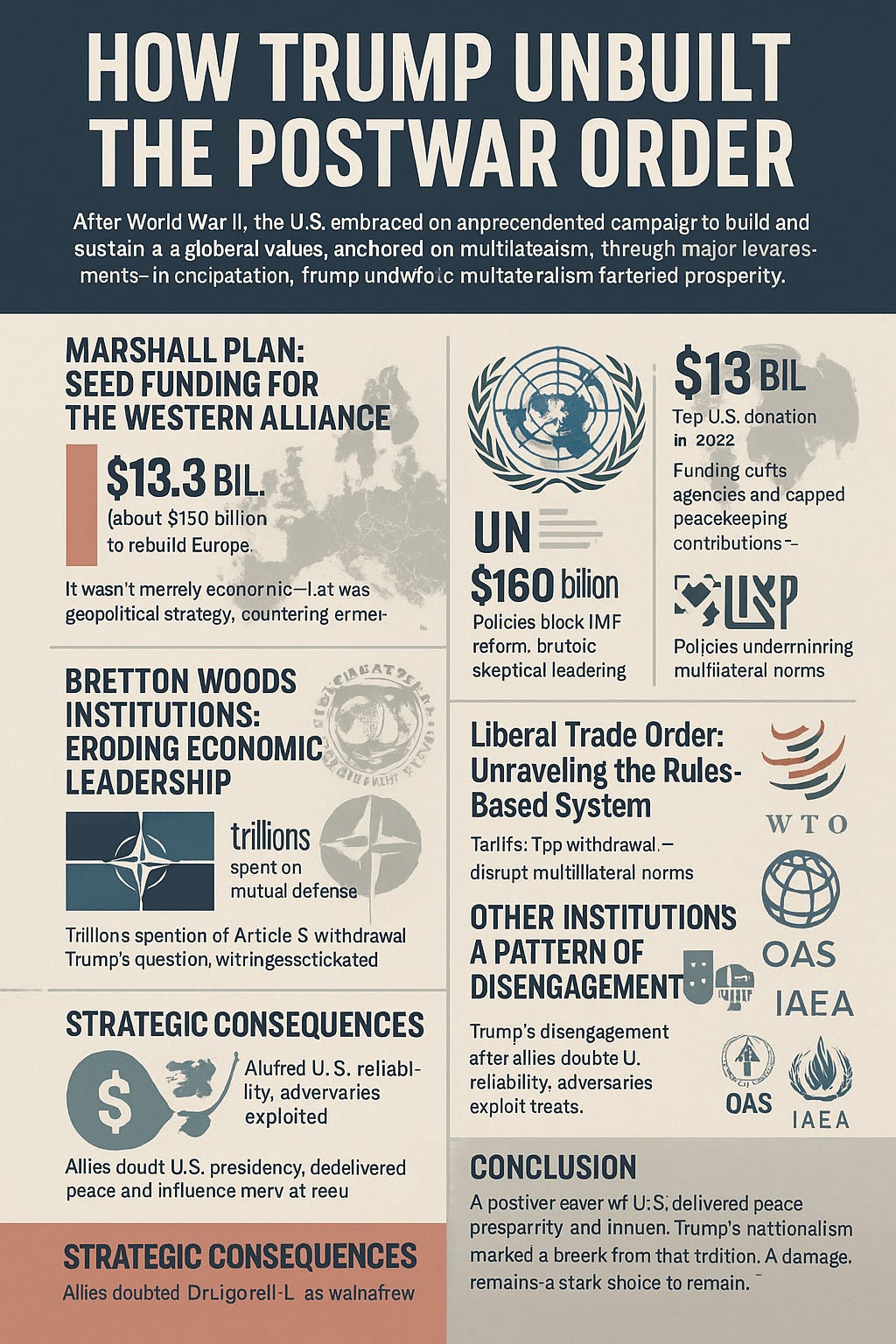The Price of Leadership: U.S. Investments in the Postwar World Order and Trump-Era Disruption
From global stability to nationalist retreat, how seventy years of American-led alliances and institutions were challenged during a single presidential term
Introduction
After World War II, the United States embarked on an unprecedented campaign to build and sustain a global order anchored in cooperation, liberal values, and American leadership. Through major investments in security alliances, international institutions, and trade frameworks, the U.S. underwrote a global system that fostered prosperity, peace, and American strategic dominance. However, from 2016 to 2020, the Trump administration disrupted this order—challenging alliances, defunding institutions, and questioning the multilateralism that defined American strategy for generations.
Marshall Plan: Seed Funding for the Western Alliance
The Marshall Plan was the U.S.'s first massive peacetime foreign aid initiative, delivering $13.3 billion (about $130 billion in today's dollars) to rebuild Europe. It wasn’t merely economic relief—it was geopolitical strategy, countering communism and fostering European unity. Trump’s vision of foreign aid—marked by deep proposed cuts and transactional conditions—reversed this philosophy. Though he didn’t undo historical legacies, he ended major assistance to countries like Ukraine and Central America, diminishing U.S. soft power.
United Nations: From Builder to Critic
The U.S. helped found the UN and remains its top donor, providing $13 billion in 2023 alone. American support has ensured peacekeeping operations, humanitarian efforts, and global cooperation. Yet under Trump, funding was cut to major agencies like UNRWA and UNFPA, the U.S. withdrew from UNESCO and the Human Rights Council, and contributions to peacekeeping were capped. Trump’s attacks on "globalism" weakened the legitimacy of the institutions the U.S. once championed.
Bretton Woods Institutions: Eroding Economic Leadership
The U.S. was the architect and primary financier of the Bretton Woods system, contributing over $160 billion to the IMF and billions more to the World Bank. These institutions have stabilized currencies and aided development across the globe. Trump-era policies undermined U.S. leadership by blocking IMF quota increases, appointing skeptical leaders, and reducing enthusiasm for multilateral lending. Confidence in America's economic stewardship weakened, while rivals like China expanded influence.
NATO: From Keystone to Question Mark
NATO was built on U.S. security guarantees, with the U.S. investing trillions in defense, deployments, and joint budgets. Trump questioned Article 5, threatened withdrawals, and demanded allies increase spending. Although defense spending did rise and programs like the European Deterrence Initiative expanded, the credibility of U.S. commitments suffered. Trust among allies eroded, opening strategic gaps.
Liberal Trade Order: Unraveling the Rules-Based System
The U.S. led the creation of GATT and the WTO, investing heavily in open trade. Trump reversed this trajectory, launching tariffs against China and allies, paralyzing the WTO’s dispute system, and withdrawing from TPP. While he secured new bilateral deals like USMCA, these moves weakened multilateral norms and disrupted global supply chains. The U.S. shifted from rule-maker to unilateral actor.
Other Institutions: A Pattern of Disengagement
Trump’s disengagement extended to the OAS, OECD, IAEA, and global summits like the G7 and G20. He undercut norms, skipped communiqués, and withdrew from arms control treaties. While these moves didn’t always involve major funding losses, they reflected a systemic U.S. retreat from cooperative leadership.
Strategic Consequences
The cumulative impact of Trump’s policies wasn’t just budgetary—it was existential. Allies questioned U.S. reliability, adversaries capitalized on discord, and the machinery of global governance faltered. Billions in direct investment and trillions in strategic capital risked depreciation. Although many actions were reversed post-2020, the damage to trust and credibility was deep.
Conclusion
The United States built a postwar world order through unparalleled economic and strategic investment. For 70+ years, that order delivered peace, prosperity, and influence. Trump’s presidency marked a break from that tradition, prioritizing nationalism over multilateralism. As America reassesses its role, the choice is stark: rebuild and modernize this order or allow its legacy—and the investment it represents—to decay.


